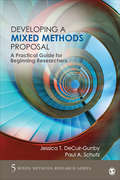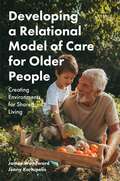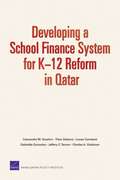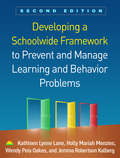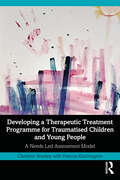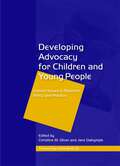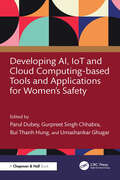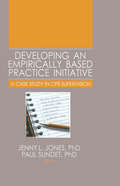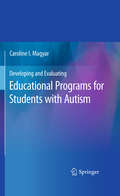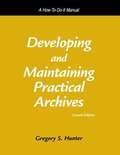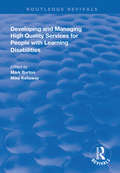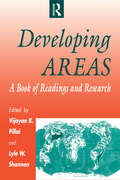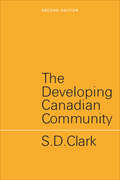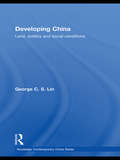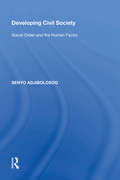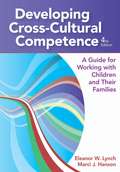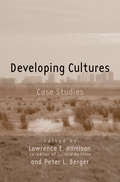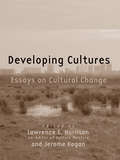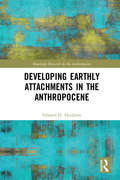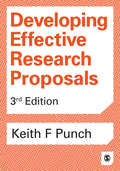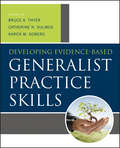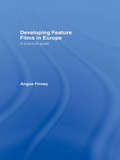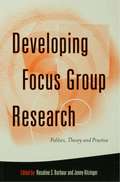- Table View
- List View
Developing a Mixed Methods Proposal: A Practical Guide for Beginning Researchers (Mixed Methods Research Series #5)
by Paul A. Schutz Jessica DeCuir-GunbyThis practical, hands-on guide helps beginning researchers create a mixed methods research proposal for their dissertations, grants, or general research studies. The book intertwines descriptions of the components of a research proposal (introduction, literature review, research methods, etc.) with discussions of the essential elements and steps of mixed methods research. Examples from a real-world, interdisciplinary, mixed methods research study demonstrate concepts in action throughout the book, and an entire sample proposal appears at the end of the book, giving readers insight into every step up to completion. Readers who complete the exercises in each chapter will have an individualized, detailed template for their own mixed methods research proposal. Developing a Mixed Methods Proposal is Volume 5 in the SAGE Mixed Methods Research Series.
Developing a Mixed Methods Proposal: A Practical Guide for Beginning Researchers (Mixed Methods Research Series #Vol. 5)
by Paul A. Schutz Jessica DeCuir-GunbyThis practical, hands-on guide helps beginning researchers create a mixed methods research proposal for their dissertations, grants, or general research studies. The book intertwines descriptions of the components of a research proposal (introduction, literature review, research methods, etc.) with discussions of the essential elements and steps of mixed methods research. Examples from a real-world, interdisciplinary, mixed methods research study demonstrate concepts in action throughout the book, and an entire sample proposal appears at the end of the book, giving readers insight into every step up to completion. Readers who complete the exercises in each chapter will have an individualized, detailed template for their own mixed methods research proposal. Developing a Mixed Methods Proposal is Volume 5 in the SAGE Mixed Methods Research Series.
Developing a Relational Model of Care for Older People: Creating Environments for Shared Living
by James Woodward Jenny KartupelisCare of older peopley is a major issue in the UK, crossing the boundaries between emotion, practical issues and economics. Yet many current concerns, and much conventional planning, are based on outdated assumptions or misunderstandings about the nature of ageing. Woodward and Kartupelis work to shatter these myths to create new and more useful models for our society. Drawing on recent research, the book zeroes in on the nature of interpersonal relationships, their critical effect and the factors which affect their formation. The book has been inspired by the extensive work undertaken by both authors in the field of promoting the spiritual wellbeing of older people in in the UK, and brings together a diversity of expertise to propose a revolutionary new approach based on nurturing particular types of relationship. Stimulating and eminently readable, this key text will play a vital role in reimagining care for the elderly and recognising the full potential of our older population.
Developing a School Finance System for Ka-12 Reform in Qatar
by Louay Constant Jeffery C. Tanner Titus Galama Gabriella C. Gonzalez Cassandra M. GuarinoReform-minded leaders of Qatar, who have embarked on a sweeping reform of their nation's education system, asked RAND to evaluate their education finance system and offer suggestions for improvements. The authors analyze the system's evolution and resource allocation patterns between 2004 and 2006 and develop analytic tools for performing the evaluation, including a framework that allows assessment of the system in light of six main objectives.
Developing a Schoolwide Framework to Prevent and Manage Learning and Behavior Problems, Second Edition
by Kathleen Lynne Lane Holly Mariah Menzies Wendy Peia Oakes Jemma Robertson KalbergNow revised and expanded, this volume explains how to design, implement, and evaluate a comprehensive, integrated, three-tiered (Ci3T) model of prevention. Rather than presenting a packaged program, the book provides resources and strategies for designing and tailoring Ci3T to the needs and priorities of a particular school or district community. Ci3T is unique in integrating behavioral, academic, and social–emotional components into a single research-based framework. User-friendly features include tools for collecting and using student and schoolwide data; guidance for selecting effective interventions at each tier; detailed case examples; and tips for enhancing collaboration between general and special educators, other school personnel, and parents. In a convenient large-size format, the volume includes several reproducible forms that can be downloaded and printed for repeated use. Prior edition title: Developing Schoolwide Programs to Prevent and Manage Problem Behaviors. New to This Edition *Updated step-by-step approach reflecting the ongoing development of Ci3T. *Chapter on evidence for the effectiveness of tiered models. *Chapter on low-intensity, teacher-delivered strategies. *Chapter on sustaining effective implementation and professional development. *"Lessons Learned" feature--reflections and examples from educators in a range of settings.
Developing a Therapeutic Treatment Programme for Traumatised Children and Young People: A Needs Led Assessment Model
by Christine Bradley Francia KinchingtonThis manual sets out an accessible model for assessing the emotional needs of traumatised children and young adults and using the outcomes of the assessment to develop individualised therapeutic programmes to support their needs and emotional development.Evolved from Christine Bradley’s over 40 years of working with children and young people with complex histories, the model and the case studies presented are firmly rooted in a psychotherapeutic approach and her early training of working with pioneers in the field. It presents a needs led assessment and treatment tool that offers insight and an understanding of the complex histories and behaviours of individual children and young people based on the impact that trauma has on the inner world of the child. The treatment programme is presented in a clearly written and highly accessible step-by-step approach that is supplemented by exemplar case studies and moving anecdotes.This manual will be of use to any professional working with traumatised children and young people including therapists, social workers, foster carers, and teachers. It will allow individuals who otherwise would not feel they possess the confidence, knowledge, training, or experience to conduct a high quality effective individualised needs led assessment and subsequent treatment programme.
Developing Advocacy for Children and Young People: Current Issues in Research, Policy and Practice
by Hilary Horan Andrew Pithouse Anne Crowley Abigail Knight Sophie Laws Jane Boylan Jane Dalrymple Christine Oliver Maureen Winn Oakley Elaine Chase Perpetua Kirby'The role of an advocate for children is one that I perform myself which is why I have found much of the research presented in this book so interesting... We are all on the same side battling to improve life for children who have, through no fault of their own, been handed a very bad set of cards.' - From the Foreword by Cherie Booth QC Advocacy for vulnerable people is increasingly becoming a part of health and social care practice, and over the past decade policy developments have contributed to a rapid development of advocacy services for children and young people. This book explores the latest debates and findings relating to research and practice in the field of children and young people's advocacy. Contributors present the key issues and dynamics of current advocacy practice and examine its role within health, education and social care services, including its impact on inter-professional collaboration, the development of personalised services and the barriers and facilitators to children's participation in children's services. This book will be valued by any professional working with young people, including children and young people's advocates, health and social care professionals, teachers and youth workers.
Developing AI, IoT and Cloud Computing-based Tools and Applications for Women’s Safety
by Parul Dubey Gurpreet Singh Chhabra Bui Thanh Hung Umashankar GhugarIn a world increasingly driven by technology, this book explores the intersection of artificial intelligence (AI), IoT, and Cloud Computing and women's safety, highlighting the transformative potential of technology in safeguarding women's well-being in the physical and the digital world. As the safety and security industry embraces technological advancements, the need for inclusive and gender-centric solutions has become increasingly evident. This reference book delves into this critical area, showcasing the development of AI, IoT, and Cloud applications specifically tailored to address the unique safety challenges faced by women.• Provides a comprehensive exploration of how AI and related technologies are reshaping the future of women's safety.• Emphases the utilisation of AI to tackle the specific challenges women encounter in various contexts.• Introduces innovative solutions such as wearable technology, AI-powered surveillance systems, and mobile applications designed for emergency responses.• Discusses ethical implications of deploying technology for personal security and navigates the evolving legal landscape surrounding data privacy.• Bridges the gap between theoretical discussions and practical implementations, offering a guide to developing technology for the improvement of women's safety.It is an invaluable resource for professionals and researchers interested in the transformative role of AI, IoT, and Cloud in shaping the future of women's safety.
Developing an Empirically Based Practice Initiative: A Case Study in CPS Supervision
by Jenny L. Jones Paul SundetDeveloping an Empirically Based Practice Initiative documents practice techniques that were used during a three-year training/demonstration project for child welfare supervisors working in the frontlines of child protection services in the Southeastern United States. This unique book is a guide to combining research methodology with staff training to enhance the quality of evidence-based practice in the field. The book examines techniques that were used in training modules in four states, highlighting practice models and intervention outcomes from an evidence-based perspective.Developing an Empirically Based Practice Initiative includes details about the project from the federal perspective (The Children’s Bureau) and the operational implications at the Southern Regional Quality Improvement Center (SRQIC) level. The book examines the issues of providing technical research assistance to child welfare agencies and the complexities of cross-site evaluation with different political jurisdictions. Developing an Empirically Based Practice Initiative examines: The Children’s Bureau discretionary grant program the relationship between child welfare workers’ career plans and their abilities to accomplish core work tasks secondary traumatic stress (STS) in child protective services workers methods for monitoring and evaluating child welfare supervisors clinical decision-making as a tool for building effective supervision skills the use of outcome data for decision-making the development and implementation of the Tennessee project the use of “360-degree” evaluations to improve clinical skill development the Intervention Design and Development modelDeveloping an Empirically Based Practice Initiative is an invaluable aid for social work practitioners, child welfare workers, case managers, and supervisors, and for social work academics and students.
Developing and Evaluating Educational Programs for Students with Autism
by Caroline I. MagyarRecent years have witnessed a marked increase both in the number of children diagnosed with autism spectrum disorders (ASDs) and those placed alongside their typically developing peers in general education classrooms. These events bring with them a plethora of challenges, particularly in the areas of program design and educational practices. Developing and Evaluating Educational Programs for Students with Autism offers systematic, evidence-based guidelines--as well as tools, checklists, and other resources--for creating effective learning environments for students across the autism spectrum and the grade span. Planning, development, implementation, and continuous evaluation are examined in detail in this practical volume, which features: An overview of the ASDs, with an emphasis on effective educational practice.In-depth discussion of the ASD Program Development and Evaluation Protocol.A staff training model for personnel working with students with ASD.A detailed framework for student support teams and family-school collaboration.Specific guidelines for conducting needs assessments and student evaluations.* Case examples of applications of the protocol on the program, school, and regional levels. Developing and Evaluating Educational Programs for Students with Autism is a uniquely rigorous and thorough reference benefiting school psychologists and special education professionals as well as those in allied educational and mental health fields, including clinical child, school, and developmental psychologists, psychiatrists, and other professionals working with children with autism.
Developing and Maintaining Practical Archives: A How-To-Do-It Manual (How-To-Do-It Manuals for Libraries Ser. #122)
by Gregory S. HunterLibrary Journal and other review journals raved about the first edition of this now-standard guide. This new edition has been completely updated and expanded to include crucial new information on digital records, encoded archival description (EAD), copyright issues, post-9/11 security concerns, and international perspectives on these issues--content that makes this manual essential for archivists of all backgrounds. Setting up archives, appraisal and accessioning, acquisition strategies and policies, arrangement description, reference and access, preservation, and electronic records are just some of the topics covered in both theory and practice in this clear, comprehensive, and practical guide.
Developing and Managing High Quality Services for People with Learning Disabilities (Routledge Revivals)
by Mark Burton Mike KellawayFirst published in 1998 , This timely book describes the challenges that need to be met in bringing together health and social services into a partnership to create effective and responsive services. It presents the reader with both conceptual frameworks and practical examples on how change can be managed and the momentum maintained towards the development of a quality service. The authors present practical examples and reflect on what worked and what was not successful. Over twenty writers (staff and managers, senior and junior, qualified and unqualified) describe focused work in particular areas which will be of interest to any service for this user group. Throughout, the emphasis is on how to deliver an accessible good quality service and how this can be safeguarded in the future. Fifty years after the establishment of the NHS, and nearly twenty five years since the establishment of British Social Services departments, this book articulates a modern, practical and principled vision of community based services to vulnerable people.
Developing Areas: A Book of Readings and Research (Explorations in Anthropology)
by Vijayan K. Pillai Lyle W. Shannon Judith L. MckimWith subjects ranging from the global challenge of the AIDS epidemic to the role of family planning in developing nations, and the link between Central America's forests and North America's hamburgers, this interdisciplinary introduction by some of the world's foremost experts in development studies will be an essential text for courses in this area. It provides an exhaustive overview of the social, political, economic and population problems of countries in what is usually referred to as the Third World and, more recently, the Fourth World. Although colonialism is considered as a contributing factor to underdevelopment, emphasis in this volume is placed on the interrelation of major social institutions, their impact on economic and social development, and the effect of rapidly expanding industrialization on the ecosystem.
The Developing Canadian Community: Second Edition
by S. D. ClarkProfessor Clark's thesis is that the development of Canadian society can only be understood by examining how changes taking place in the underlying structure of the Canadian community. The first part of the book examines the development of forms of social organization in Canada over the years 1600 to 1920. In the second and third sections the focus shifts to the general forces in Canadian society shaping the character of institutions and forms of social life. The book concludes with four essays devoted to an examination of the relationship of sociology to history. This volume demonstrates the mutually enriching value of a sociological-historical approach, and is very useful for those interested in communities, social change and organization, and the structure of Canadian society.
Developing China: Land, Politics and Social Conditions (Routledge Contemporary China Series #Vol. 40)
by George C.S. LinIn the first systematic documentation of the pattern and processes of land development taking place in China in the last two decades George C.S Lin advocates a fresh and innovative approach that goes beyond the privatization debate to probe directly into the social and political origins of land development. He demonstrates the special and paradoxical nature of China’s land development and challenges the perceived notion of a causal relationship between property rights definition, efficient land use, and sustained economic growth. In contrast to the existing literature in which changes in urban and rural land are treated separately, the rural-urban interface is shown to be the most significant and contentious locus of land development where competition for land has been intensified and social conflicts frequently erupted. Theoretically provocative and empirically well-grounded, Developing China provides a systematic, insightful, and authoritative account of the enormous development of China’s precious land resources. As such, it will be of great interest to scholars, students, and professional practitioners in the fields of development studies, political economy, regional political ecology, planning, economics, geography, land use management, and sustainable development with a special focus on contemporary China under market transition.
Developing Civil Society: Social Order and the Human Factor
by Senyo AdjibolosooFollowing on from his earlier volume, Globalization and the Human Factor, Senyo Adjibolosoo focuses attention on the prospects for establishing civil society through the development of a positive human factor. As civil society can neither be brought into existence by factors such as stringent legislation, economic development, political manoeuvring and violent civil disobedience, nor by chance, these orthodox procedures have proved to be nothing more than unproductive quick-fix solutions. This study examines how previous social engineering programmes failed because of the preoccupation with the symptoms of severe human factor decay (HFD). The necessary conditions for a successful evolution of a principle-centred civil society is the availability of a positive human factor, without which no group of people can achieve and sustain civil liberties, human rights or the rule of law. Provocative and challenging, this book illustrates how positive human factor is essential to not only developing but also industrialized countries.
Developing Cross-cultural Competence: A Guide For Working With Children And Their Families, Fourth Edition
by Eleanor W. Lynch Marci J. Hanson Deborah Chen<P><P>As the U.S. population grows more and more diverse, how can professionals who work with young children and families deliver the best services while honoring different customs, beliefs, and values? The answers are in the fourth edition of this bestselling textbook, fully revised to reflect nearly a decade of population changes and best practices in culturally competent service delivery. <P><P> The gold-standard text on cross-cultural competence, this book has been widely adopted by college faculty and trusted as a reference by in-service practitioners for almost 20 years. For this timely NEW edition, the highly regarded authors have carefully updated and expanded every chapter while retaining the basic approach and structure that made the previous editions so popular. Professionals will <P><P> Get a primer on cultural competence. Readers will examine how their own cultural values and beliefs shape their professional practice, how the worldviews of diverse families may affect their perceptions of programs and services, and how providers can communicate more effectively with families from different cultural backgrounds. Deepen their understanding of cultural groups. Learn from in-depth chapters with nuanced, multifaceted explorations of nine different cultural backgrounds: Anglo-European, American Indian, African American, Latino, Asian, Filipino, Native Hawaiian and Samoan, Middle Eastern, and South Asian. Readers will get up-to-date insights on history, demographics, traditions, values, and family structure, and they'll examine the diverse ways each culture approaches child rearing, medical care, education, and disability. Discover better ways to serve families. Readers will get concrete recommendations for providing more effective, sensitive, and culturally competent services to children and families. They'll find practical guidance for every step in the service delivery process, from initiating contact with families to implementing and evaluating services. Vivid case stories and photos bring the principles of cultural competence to life, and the helpful appendixes give professionals quick access to cultural courtesies and customs, key vocabulary words, significant cultural events and holidays, and more. Plus an expanded list of resources points readers to books, films, theater, and other media that will enhance their understanding of other cultures. New to this edition is a revised chapter on African American roots; thoroughly updated and expanded chapters; expanded coverage of disabilities; more on spiritual and religious diversity; and strategies for helping families make decisions about language use (English-only vs. preservation of native language). <P><P> Equally valuable as a textbook and a reference for practicing professionals, this comprehensive book will prepare early interventionists and other professionals to work effectively with families whose customs, beliefs, and values may differ from their own.
Developing Cultures: Case Studies
by Lawrence E. Harrison Peter BergerDeveloping Cultures: Case Studies is a collection of 27 essays by a group of leading internationals scholars on the role of culture and cultural change in the evolution of countries and regions around the world.
Developing Cultures: Essays on Cultural Change
by Lawrence E. Harrison Jerome KaganDeveloping Cultures: Essays on Cultural Change is a collection of 21 expert essays on the institutions that transmit cultural values from generation to generation. The essays are an outgrowth of a research project begun by Samuel Huntington and Larry Harrison in their widely discussed book Culture Matters the goal of which is guidelines for cultural change that can accelerate development in the Third World. The essays in this volume cover child rearing, several aspects of education, the world's major religions, the media, political leadership, and development projects.The book is companion volume to Developing Cultures: Case Studies.(0415952808).
Developing Earthly Attachments in the Anthropocene (Routledge Research in the Anthropocene)
by Edward H. HuijbensThis book explores the development and significance of an Earth-oriented progressive approach to fostering global wellbeing and inclusive societies in an era of climate change and uncertainty. Developing Earthly Attachments in the Anthropocene examines the ways in which the Earth has become a source of political, social, and cultural theory in times of global climate change. The book explains how the Earth contributes to the creation of a regenerative culture, drawing examples from the Netherlands and Iceland. These examples offer understandings of how legacies of non-respectful exploitative practices culminating in the rapid post-war growth of global consumption have resulted in impacts on the ecosystem, highlighting the challenges of living with planet Earth. The book familiarizes readers with the implied agencies of the Earth which become evident in our reliance on the carbon economy – a factor of modern-day globalized capitalism responsible for global environmental change and emergency. It also suggests ways to inspire and develop new ways of spatial sense making for those seeking earthly attachments. Offering novel theoretical and practical insights for politically active people, this book will appeal to those involved in local and national policy making processes. It will also be of interest to academics and students of geography, political science, and environmental sciences.
Developing Effective Research Proposals
by Keith F PunchSuccessful research requires effective and thorough preparation. In this expanded and updated Second Edition of Developing Effective Research Proposals Keith Punch offers an indispensable guide to the issues involved in proposal development and in presenting a well-considered plan for the execution of research. Dealing with both qualitative and quantitative approaches to empirical research across the social sciences, the Second Edition comprehensively covers the topics and concerns relevant to the subject and is organized around three central themes: What is a research proposal, who reads proposals and why?; How can we go about developing a proposal?; and What might a finished proposal look like? New features of this edition include: - Expanded sections covering research strategy, research planning and academic writing - Examples of successful research proposals from across the social science disciplines - A more comprehensive discussion of ethics - A brand new glossary and chapter summaries The Second Edition will be welcomed by all those preparing or evaluating research proposals, and will be invaluable across all areas of social science, both basic and applied, and for students undertaking quantitative, qualitative and mixed-method studies.
Developing Effective Research Proposals
by Keith F PunchLecturers, request your electronic inspection copy This is your step-by-step guide to success with your research proposal. This new edition covers every section of the proposal, telling you all you need to know on how to structure it, bring rigour to your methods section, impress your readers and get your proposal accepted. With practical tips and advice throughout, new features include: Comprehensive explanation of method and methodology, and how to maximize this crucial section of your proposal A new section on mixed methods: an increasingly common approach in research A new chapter on how to get it right with ethics Fresh exercises and activities, now for each key chapter. The Third Edition provides an authoritative and accessible guide for anyone tackling a research proposal. It is perfect for students in education, nursing, health, and across the social sciences.
Developing Evidence-Based Generalist Practice Skills
by Catherine N. Dulmus Bruce A. Thyer Karen M. SowersAn essential overview of the core skills needed by every social work practitionerDeveloping Evidence-Based Generalist Practice Skills features contributions from top scholars in social work practice, presenting essential information for the ethical and effective practice of social work. This clearly written guide provides step-by-step guidance for using evidence-based practice to make joint decisions with clients about assessment and treatment options through a careful consideration of the best available research evidence, the client's preferences and values, professional ethical standards, and other key issues.Comprehensive and straightforward, this book addresses foundational practice skills expected of all social work practitioners, including:Evidence-based practiceTrauma-informed practiceInterviewing skillsProblem identification, contracting, and case planningCase managementAdvocacyCrisis interventionPractice evaluationTermination, stabilization, and continuity of careEach chapter begins with an overarching question and "what if" scenarios, and ends with a set of suggested key terms, online resources, and discussion questions. Designed as a foundation-level social work education text for undergraduate and graduate students in social work programs, this book meets the Council on Social Work Education's (CSWE) Educational Policy and Accreditation Standards (EPAS) for a thorough and up-to-date presentation of core social work skills featuring in-depth scholarship.
Developing Feature Films in Europe: A Practical Guide (Blueprint Ser.)
by Angus FinneyThe European film industry has by now lost most of its audience to American films; US productions take around eighty per cent of Europe's box-office revenues. There are many reasons for this imbalance, but one major difference between the European and the US film industries is easily identified: the Americans spend far more on development.Developing Feature Films in Europe is the first comprehensive study of this critical stage of the film-making process. Based on extensive research and interviews with more than seventy industry practitioners, it examines current funding practices, presents training initiatives for writers and producers, and highlights the potential for further improvements. Angus Finney has also compiled an invaluable directory of contacts, addresses and application procedures for public and private funding bodies throughout Europe.
Developing Focus Group Research: Politics, Theory and Practice
by Rosaline S. Barbour Jenny KitzingerThis book critically examines the potential of, and suggests ways forward in, harnessing a versatile and powerful method of research - focus groups. The book challenges some of the emerging orthodoxies and presents accessible, insightful and reflective discussions about the issues around focus group work. The contributors, an impressive group of experienced researchers from a range of disciplines and traditions, discuss different ways of designing, conducting and analyzing focus group research. They examine sampling strategies; the implications of combining focus groups with other methods; accessing views of `minority' groups; their contribution to participatory or feminist research; use of software packages; discourse analysis; and the epistemological and political underpinnings of research.
